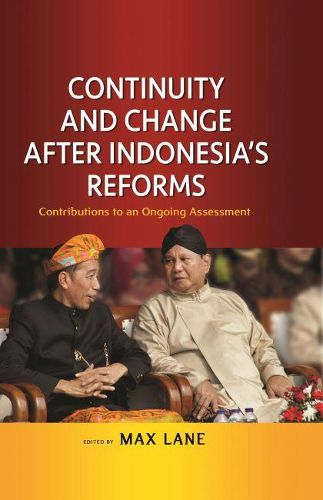Readings Newsletter
Become a Readings Member to make your shopping experience even easier.
Sign in or sign up for free!
You’re not far away from qualifying for FREE standard shipping within Australia
You’ve qualified for FREE standard shipping within Australia
The cart is loading…






This title is printed to order. This book may have been self-published. If so, we cannot guarantee the quality of the content. In the main most books will have gone through the editing process however some may not. We therefore suggest that you be aware of this before ordering this book. If in doubt check either the author or publisher’s details as we are unable to accept any returns unless they are faulty. Please contact us if you have any questions.
This book addresses one of the most crucial questions in Southeast Asia: did the election in Indonesia in 2014 of a seemingly populist-oriented president alter the hegemony of the political and economic elites? Was it the end of the paradox that the basic social contradictions in the country’s substantial capitalist development were not reflected in organized politics by any independent representation of subordinated groups, in spite of democratization? Beyond simplified frameworks, grounded scholars have now come together to discuss whether and how a new Indonesian politics has evolved in a number of crucial fields. Their critical insights are a valuable contribution to the study of this question.
- Professor Olle Toernquist, Department of Political Science, University of Oslo
A most valuable book for understanding the underpinnings of Indonesian politics in 2019 and beyond. A great range of themes are included: political parties, ideologies, political Islam, leadership legitimacy, the political middle class, the politics of centre-local relations, corruption, limited foreign policy reform, Papua, and youth activism. The book has eleven chapters, mostly by Indonesia-based analysts, plus a couple of wise old hands. Max Lane’s overview chapter is excellent.
- Professor David Reeve, School of Humanities and Languages, University of New South Wales
$9.00 standard shipping within Australia
FREE standard shipping within Australia for orders over $100.00
Express & International shipping calculated at checkout
This title is printed to order. This book may have been self-published. If so, we cannot guarantee the quality of the content. In the main most books will have gone through the editing process however some may not. We therefore suggest that you be aware of this before ordering this book. If in doubt check either the author or publisher’s details as we are unable to accept any returns unless they are faulty. Please contact us if you have any questions.
This book addresses one of the most crucial questions in Southeast Asia: did the election in Indonesia in 2014 of a seemingly populist-oriented president alter the hegemony of the political and economic elites? Was it the end of the paradox that the basic social contradictions in the country’s substantial capitalist development were not reflected in organized politics by any independent representation of subordinated groups, in spite of democratization? Beyond simplified frameworks, grounded scholars have now come together to discuss whether and how a new Indonesian politics has evolved in a number of crucial fields. Their critical insights are a valuable contribution to the study of this question.
- Professor Olle Toernquist, Department of Political Science, University of Oslo
A most valuable book for understanding the underpinnings of Indonesian politics in 2019 and beyond. A great range of themes are included: political parties, ideologies, political Islam, leadership legitimacy, the political middle class, the politics of centre-local relations, corruption, limited foreign policy reform, Papua, and youth activism. The book has eleven chapters, mostly by Indonesia-based analysts, plus a couple of wise old hands. Max Lane’s overview chapter is excellent.
- Professor David Reeve, School of Humanities and Languages, University of New South Wales